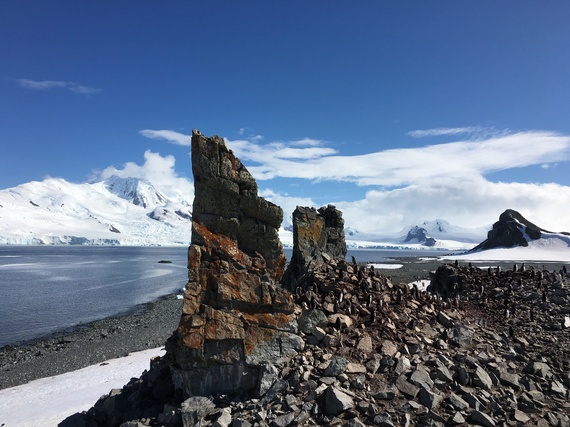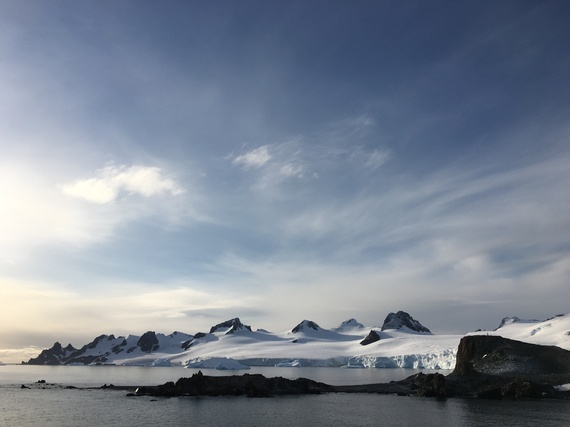
The Ice Continent. Terra Incognita. White South. Antarctica. An enormous frozen wilderness of chilling indifference. The bottom of the world. Both a barometer for and regulator of our changing global climate. Isolated. Desolate. The most heart-breakingly, breath-takingly beautiful place it has ever been my very blessed good fortune to visit.
A place of impenetrable curiosity and intrigue. H.P. Lovecraft dreamt up the 'Mountains of Madness', a terrifying tale of an ancient alien civilization hidden in Antarctica's huge interior, that in turn inspired Ridley Scott's Alien prequel 'Prometheus'. Its barren wastes are fertile only for our imaginations.
Antarctica was a relatively late arrival to our planetary consciousness, it wasn't until 1821 that men from sealer John Davis's ship first put a footprint on its shores. By then the waters were already a scene of carnage. Captain Cook's reports of islands and seas teeming with life had attracted the environmental entrepreneurs of their day.
We hunted the biggest creatures the world has ever seen, blue whales, and their smaller but still massive cousins the Rights and Humpbacks, to the brink of extinction. These oceanic leviathans, along with Elephantine and fur seals, even penguins, were harpooned, flensed, and rendered. For oil. They lit the world. The crudity of this energy makes even fossil fuels look sophisticated.
Exploitation and exploration went hand in hand. The race to the South Pole made posthumous tragi-heroes of Captain Scott's team, and Shackleton's ill-fated but ultimately humbling expedition still defines survival, resilience and masterful leadership today.
They came to conquer and plunder. Now we come in awe and wonder. Antarctica feels like a world without us, a world before us, perhaps a world after us? It cares not for humanity. It is hostile in the extreme to our weakly warm-bodied species.
Yet the thankfully now recovered wildlife doesn't fear us. Penguins eye you, beguiled. Male fur seals are fierce, but only because they see you as love rivals for their harem space on the beach. Whales are drawn alongside vessels that would have once dispatched them with an explosive bolt to the head. Nature is uncompromising, salutary, shaming of us in her unconditional forgiveness.
And she is magnificent. On our first morning anchored in the neat crescent of aptly named Half Moon Island, itself nestled amongst the flanks of more mountainous Livingston, I sat on the deck and wept uncontrollably at the emotionally staggering, sheer awesome wonder of it all. Dark serrated nunataks of sharp rock raked through a billion tonne blanket of snow and ice. Crevasses collapsing and calving a cavalcade of blue-ish bergs down into the freezing sea, a fierce sun in a cloud-free sky blazing through the thin ozone above.
Antarctica is important. More than we might at first think, because it represents both the best and worst of us. The darkest hour of our greed and slaughter in the sealing and whaling years - our capacity to brutally commodify and commercialise such stunning natural bounty, almost to the end.
But in 1959 something absolutely extraordinary happened. The Antarctic Treaty was signed literally putting preliminary national claims to its territory 'on ice'. It created a land beyond war where the environment is fully protected. A 'natural reserve' that is bigger than the United States of America 'devoted to peace and science'. Where international co-operation triumphs over competition. It is widely recognized as one of the most successful transnational agreements in history.
It is an invocation of our common heritage, our shared humanity and an embodiment of values that we all aspire to - respect for nature, evidence-led research and insight, higher aspirations and goals that truly serve our whole global family. It is simple but stirring stuff.
For me this is perhaps the first and best example of our emerging transcendence. That we can come together as one people on one planet and agree to protect our seventh continent, a substantial slice of Earth's terra firma, as a refuge from our relentless appetite for resources that has already transformed so much of the world.
Of course if Antarctica wasn't frozen beneath three kilometres of ice we'd be a lot closer to the temptations of mining and extraction we're currently denied. But there is a vital symbolism in our recent conservation of this most magical of places.
Antarctica is our test, our proving ground. Perhaps it is our first example of true global citizenship. Part of the historical arc of evolving human identity, as we identify ourselves at ever greater scales; from family, through tribe, to city or region, then nationally and now, say it softly, supra-nationally, and even, whisper it, planetary.
The story of this extraordinary land and our relationship to it should be on everyone's lips. To the cynics who decry the supposed impossibility of a more wonderful tomorrow, of conservation, collaboration and care, let's tell them we've already done it once. And we can do it again. We are all citizens of this incredible continent. We are all its ambassadors. We are all Antarcticans. And we should all be proud of this and the pathway it illuminates to a better collective future for everyone.
Ed Gillespie is Co-Founder of www.wearefuterra.com, author of 'Only Planet - a flight-free adventure around the world' and in the Antarctic...
Follow Ed Gillespie on Twitter: www.twitter.com/frucool and via #pole2soul
This blog is part of a series. Read other instalments via the author's profile page.

